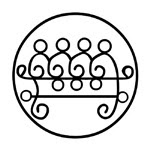It is four thirty in the morning, and in the middle of my fourth Good Eats rerun, I have received a revelation. It's in the title--more to come when I can elucidate it further.
(Several weeks later...)
Alright, let's get down to business.
Art. What the fuck is art? A portrait? A fugue or a statue? A blistering guitar solo? A pile of feces in the shape of a cross? Simply put, I contend that the question is a non-sequitur--because to call something art, or an art, is to err in the assumption that such a thing even exists. Art is nothing but inexact and partly-realized science.
Let's start arguing my characteristically sprawling thesis with a very small and specific example: the assertion that cooking is an art. To call something an art is to say that it's somehow different from a science--that there's something about it that's beyond science in some way, some spark of magic or inherent chaos to it. Anyone who knows my stance on randomness has already guessed that I don't think that's the case at all--cooking, to me, is the intersection of multiple complex and sometimes immature sciences, applied to an area that is poorly-understood and has an abundance of uncontrolled and unpredictable variables. Cooking times, for example, aren't random or otherwise beyond mortal ken--they just seem that way because they depend on the vessel, on the stove, even on the elevation of the kitchen. If you cooked the exact same pizza in exactly the same way in exactly the same place twice, they would be identical.
Now, this thesis is impossible to directly prove, for the same reason that humans invented the idea of chaos in the first place: it's impossible for limited beings like us to control every single variable. Even if we have carefully selected the ingredients, vessels, implements, altitude, cooking time, temperature, make and model year of the oven, and every other measurable variable from the grass the dairy cows were fed on to the server's relationship with his mother, there would still be tiny fluctuations that we can't control or even perceive without high-end scanning equipment--movements of air, little thermodynamic weirdnesses, and the statistical inevitability that a few molecules out of every billion will teleport somewhere else in the time it takes to make the pizza--and these will make the two pizzas different in tiny ways. The cheese will brown in different places, the crust will ferment differently, and the air inside the oven will circulate in an uneven pattern and subtly influence the way the ingredients interact.
You'll notice, however, that as we control more and more variables, our two pizzas will grow more and more alike--and it is from this that we can infer a pattern. The more primitive the implements we use, the more things are "left to chance"--that is, left outside human control--and vice versa. The variables aren't random--they're just beyond our ability to perceive or control. Yes, folks, he's saying what you think he's saying. Not only is there no such thing as art, there is no such thing as chaos. What we perceive as such is in fact a higher form of order--one beyond our ability to comprehend, but one so pervasive that we take it completely for granted!
Now consider, for a moment, what an example of high art, the kind that merits a capital A--say, Beethoven's 9th--would look like reduced to its most basic components. Take away the instruments, the conductor, the score, all the musical theory, and you're more or less left with a deaf madman whooping ebulliently at the audience.The emotion, the passion that old Ludwig poured into his work would still be there--all the substance and truth and Meaning that men learned in such things maintain that Art is all about--but it lacks any effective way of reaching us. We can't feel the ecstatic joy the composer feels, because we're not telepathic--all we see is his reaction to it, and it probably looks a little ridiculous to even the least jaded of us.What made him such an enduring and beloved composer was not some spark of divine beauty, but rather a knack, learned, genetic, or both, for effectively communicating ideas too vast and abstract for speech alone through the medium of music. This is, if one looks from the right angle, the point of all high art, if not of expression itself--to pass on an idea as directly and effectively as possible without looking so ridiculous that the observer's mind closes to it. Re-contextualizing somebody else's ideas to create the opposite effect, by the way, is known as comedy.
In future posts: I lay out the Antagonistic Order's liturgical calendar, elaborate on the importance of pre-Christian values, and get mistaken for a Nazi. This and other wacky hijinks await, in the next Letters from Amenti!
Subscribe to:
Post Comments (Atom)

No comments:
Post a Comment